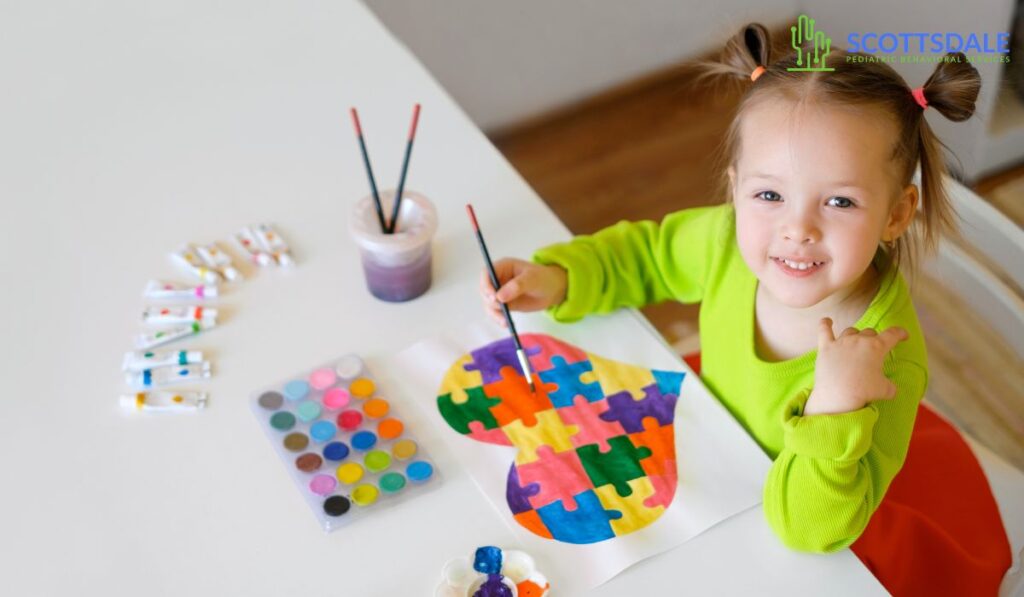Preparing Your Autism Child for School: Strategies and Tips for Success
Starting school is a pivotal moment in any child’s life. However, for parents preparing autism child for school, it often brings added anxiety and uncertainty.
To effectively prepare your Autism child for school, consider thoughtful planning, maintain open communication with educators, and ensure a nurturing home environment.
In this guide, we’ll explore valuable strategies to help your child thrive in the school setting.
Early Communication with School Staff
Building open communication is foundational for your child’s successful school journey.
As early as possible, establish a connection with your child’s teachers, therapists, and other school staff. Share information about your child’s strengths, challenges, and individualized needs.
Regular meetings with school personnel can foster a collaborative partnership and ensure your child receives the support they require.
Create a Visual Schedule
Many Autism children benefit from visual schedules or routines.
Use pictures, symbols, or words to outline the daily schedule, including school activities, transitions, and breaks.
Visual schedules can provide predictability and reduce anxiety, helping your child better understand what to expect throughout the school day.
Social Skills Training
For many Autism children, navigating social interactions can be a challenge.
Consider enrolling your child in social skills training programs or therapy sessions to help them build essential social skills.
Role-playing and structured activities can facilitate peer interactions, promote empathy, and enhance communication.
Sensory Considerations
Many children with autism exhibit sensory sensitivities. Work with your child’s school to create a sensory-friendly classroom environment.
Discuss accommodations such as sensory breaks, noise-canceling headphones, or a sensory toolkit to help your child self-regulate and stay focused.
Develop a Transition Plan
Transitions, like beginning the school day or switching classes, may pose challenges for children with autism. Develop a transition plan with the school to ease these moments.
Use visual cues or timers to signal upcoming transitions and provide your child with adequate preparation.
Foster Independence
Encourage independence by teaching your child essential life skills such as self-care routines and organizing their belongings.
These skills can boost your child’s confidence and help them navigate the school day more successfully.
Practice Communication
Support your child’s communication skills by practicing verbal and non-verbal communication at home.
Use tools like social stories to prepare your child for different social scenarios they may encounter at school.
Encourage open dialogue at home to address any concerns or questions your child may have.
Advocate for Your Child
As a parent, you are your child’s best advocate. Stay informed about your child’s educational rights and seek appropriate accommodations.
Be prepared to communicate your child’s needs effectively and work closely with the school to ensure they receive the support necessary for their success.
Be Patient and Flexible
Every child is unique, and progress may vary. Be patient with your child as they adapt to the school environment.
Be open to making adjustments as needed, and don’t hesitate to seek additional resources or support if required.
Celebrate Achievements
Celebrate your child’s achievements, no matter how small they may seem.
Recognizing their efforts and progress can boost their self-esteem and motivation.
Share these successes with your child’s school to foster a positive and supportive atmosphere.
Build a Strong Support Network
Seek out local support groups, online communities, or organizations that specialize in autism.
Connecting with other parents who have gone through similar experiences can provide valuable insights and emotional support.
Individualized Education Plan (IEP)
Work with the school to develop an Individualized Education Plan tailored to your child’s unique needs.
An IEP outlines specific goals, accommodations, and services your child will receive to ensure they receive an appropriate education.
Home-School Collaboration
Maintain open lines of communication with the school.
Regularly check in with teachers and therapists to discuss your child’s progress and address any concerns promptly.
Emphasize Strengths
Focus on your child’s strengths and interests.
Encourage the school to incorporate these into the curriculum or extracurricular activities to enhance your child’s engagement and motivation.
Behavioral Supports
Should your child exhibit challenging behaviors, partner with the school to devise a proactive behavior support plan.
This plan should identify triggers, strategies for prevention, and interventions to address challenging behaviors effectively.
Transition Planning
As your child progresses through different grade levels or school environments, ensure that transition plans are in place.
This helps minimize disruptions and anxiety during transitions to new teachers or schools.
Home-School Communication Log
Consider maintaining a communication log between home and school.
This can help track your child’s daily experiences, successes, and challenges, enabling both you and the school to provide consistent support.
Teach Self-Advocacy
As your child matures, empower them to advocate for their own needs.
Teach them how to express their needs and preferences and to ask for help when required.
This skill is essential for building independence.
Sensory Diet
Develop a sensory diet for your child with input from a sensory therapist. A sensory diet includes sensory activities that can help your child regulate their sensory sensitivities and maintain focus.
Plan for Transitions to Higher Education or Work
As your child approaches the end of their school years, start thinking about their transition to higher education or employment.
Furthermore, explore vocational training, job coaches, and college support services tailored to autistic individuals.
Monitor and Adjust
Continuously assess your child’s needs and progress.
Additionally, be prepared to adjust strategies, therapies, or accommodations as your child’s development and educational requirements evolve.
Promote Inclusivity
Moreover, advocate for inclusivity and autism awareness within the school community.
Furthermore, organize events or workshops to educate teachers, students, and parents about autism and promote understanding and acceptance.
Seek Professional Guidance
Consult with experts in the field of autism, such as pediatricians, psychologists, or developmental specialists, to ensure that you’re providing the best possible support for your child.
Conclusion
Moreover, setting your child with autism up for school success hinges on meticulous planning, transparent communication, and dedication to their unique needs.
Furthermore, by working collaboratively with educators, addressing sensory sensitivities, and providing social and emotional support, you can help your child thrive in the school environment.
Moreover, remember that every child is unique, and with the right strategies and patience, your child can indeed have a successful and fulfilling school experience.
Contact us today! Visit https://www.scottsdalepbs.com/#contact-form for more information.
FAQs
What is autism, and how does it affect a child’s readiness for school?
Autism Spectrum Disorder (ASD), often referred to as autism, is a developmental disorder that significantly affects social interaction, communication, and behavior. Moreover, it can vary widely in its impact on children. Some children with autism may face specific challenges related to sensory sensitivities, communication difficulties, or social interactions. These challenges can significantly influence their readiness for school.
How can I determine if my child is ready for school, especially if they are Autism?
Assessing school readiness involves looking at both academic and social-emotional factors. For autistic children, it’s crucial to consider their individual needs and abilities. Additionally, consult with educators, therapists, and specialists who can provide insights into your child’s readiness and recommend appropriate supports.
What are some signs that my Autism child may not be ready for school?
igns that an autistic child may not be ready for school can include various indicators such as extreme anxiety or meltdowns related to school discussions, difficulty with communication or social interactions, sensory sensitivities that interfere with daily activities, and a lack of essential self-care skills. Therefore, it’s crucial to address these concerns through early intervention and support.
What steps can I take to help my Autism child adapt to the school environment?
Moreover, preparing your autistic child for school entails creating a structured routine at home, addressing sensory sensitivities, providing social skills training, and promoting independence in self-care tasks. Effective communication with the school and collaborating with educators are also essential steps.
Are there specific school accommodations available for Autism children?
Yes, indeed, there are various accommodations that schools can provide for autistic students, depending on their individual needs. These accommodations may include Individualized Education Plans (IEPs), sensory-friendly classroom environments, visual schedules, social skills support, speech and language therapy, and more. Therefore, it’s essential to collaborate with the school to determine the most appropriate accommodations.
How can I support my Autism child’s social development in preparation for school?
Furthermore, support your child’s social development by arranging playdates, engaging in social skills training, and practicing social interactions at home. Social stories, role-playing, and modeling appropriate social behavior can also be beneficial.
What should I do if my child experiences bullying or social challenges at school due to their autism?
Moreover, address any bullying or social challenges promptly by communicating with the school and advocating for your child. Additionally, work closely with educators to develop strategies to prevent bullying and promote inclusion. Furthermore, encourage your child to communicate their experiences and emotions with you.
How can I balance my child’s need for structure with their need for flexibility and creativity in their education?
Achieving a balance between structure and flexibility is crucial. Maintain a consistent routine while allowing room for your child’s interests and creativity. Additionally, incorporate their strengths and preferences into learning activities to keep them engaged and motivated.
Are there resources or organizations that can provide additional support for parents of Autism children preparing for school?
Yes, indeed, numerous resources and organizations offer support and guidance for parents of autistic children. For instance, autism advocacy groups, parent support networks, and educational websites can provide valuable information and connections to help you navigate the school readiness process.
What should I do if I have concerns about my child’s readiness for school or their educational experience?
Additionally, incorporate their strengths and preferences into learning activities to keep them engaged and motivated. Moreover, open communication and collaboration with professionals can help address concerns and ensure your child receives appropriate support.

